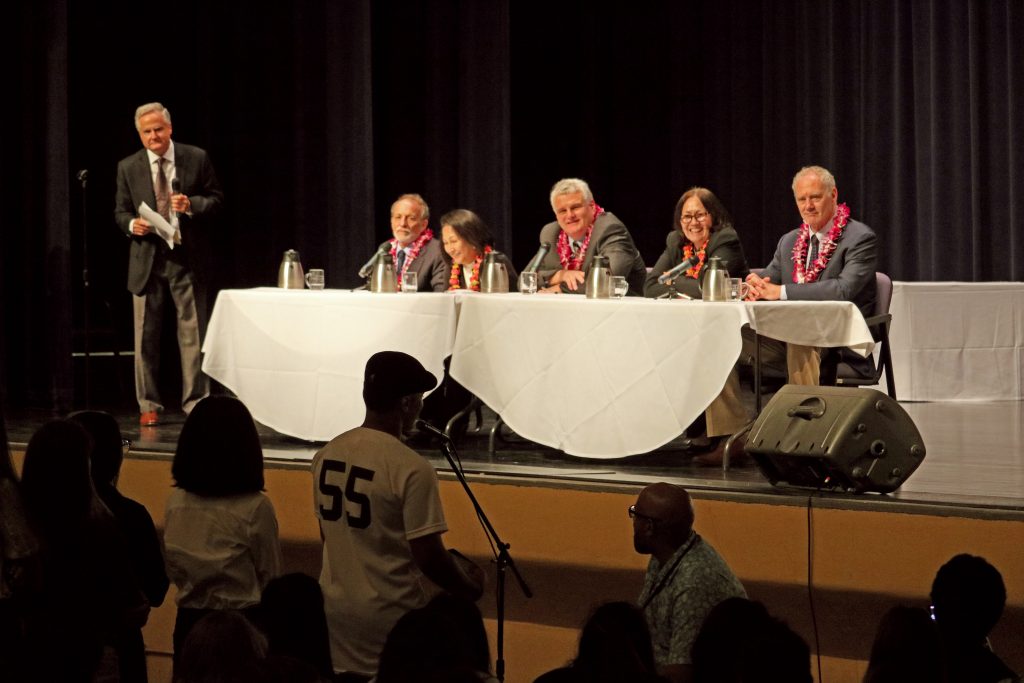Hawai‘i Supreme Court Holds Oral Argument at Maui’s Baldwin HS

Laughter and learning were part of the Courts in the Community Program when high school students asked questions of the Hawaiʻi Supreme Court Justices. The Hawaiʻi Supreme Court heard oral argument on April 27, 2017 at Baldwin High School on Maui. Left to right: Event Moderator Judge Joel August (ret.), Associate Justice Richard Pollack, Associate Justice Paula Nakayama, Chief Justice Mark Recktenwald, Associate Justice Sabrina McKenna, Associate Justice Michael Wilson.
More than 500 students attended oral argument for the Hawaiʻi Supreme Court today at Baldwin High School in an outreach event hosted by the Judiciary’s Courts in the Community program.
Hundreds of students from across Maui, including Baldwin High School, Maui High School, Lahainaluna High School, Kīhei Charter High School, St. Anthony School, Seabury Hall, King Kekaulike High School, Akaīula School, and Molokaīi High School attended the event.
Students had the opportunity to enhance their understanding of the Judiciary’s role in government and its function in resolving disputes in a democratic society.
Under the program, the Hawaiīi Supreme Court convenes in schools to hear oral argument in cases pending before the court. This is the ninth argument in the program, which began in 2012.
To prepare, the participating juniors and seniors from each school studied a curriculum developed by the Kamehameha V Judiciary History Center and the Students for Public Outreach and Civic Education of the University of Hawaii’s William S. Richardson School of Law. Attorneys from the Maui County Bar Association also volunteered their time and facilitated a moot court activity in the participating classrooms, where the students had the opportunity to argue the case themselves before attending the Courts in the Community event.
“Our Courts in the Community program is about hands-on civics education and providing students with a chance to go beyond the textbooks by observing a real Supreme Court oral argument. Through this experience, we hope that the students realize it is a process with integrity, one that’s designed to get the truth. That understanding is vital to the future of our democracy,” said Chief Justice Mark Recktenwald.
“I would like to extend a special mahalo to the teachers, the Maui County Bar Association, the Hawaiʻi State Bar Association, the Hawaiʻi State Bar Foundation, and the dozens of volunteer attorneys who helped make this happen. These invaluable partnerships are what make the program a success,” said Recktenwald.
The Hawaiʻi State Bar Association and the Hawaiʻi State Bar Foundation generously provided the students with lunches and transportation to and from their schools on Maui.
“I’d like to thank our attorneys who enthusiastically volunteered to visit participating classrooms for pre-event discussions and preparations,” said HSBA President-Elect Howard K.K. Luke. “It was exciting to see the students intently following the arguments and asking very probing questions after the official court proceedings.”
“The Maui County Bar Association is delighted to have this chance to work with Maui’s teachers and students,” said MCBA President Brandon Segal. “As attorneys, one of the most beneficial things we can do for our community is simply teach people how the justice system works. Through Courts in the Community, students gain knowledge and experience that they will use as future leaders in society. The Maui Bar would like to thank everyone who made this day happen, especially the Hawaiʻi Supreme Court, the volunteer attorneys, the teachers and school administrators, and the students themselves for being such enthusiastic participants.”
The court heard oral argument in the case of State v. George Fukuoka. Oral argument was followed by two separate question-and-answer sessions for the students – one with the attorneys and another with the five justices.
According to a Judiciary brief, the following in a description of the case up for review:
On September 28, 2014, Petitioner was arrested for Operating a Vehicle Under the Influence of an Intoxicant (OVUII) and ordered to appear at the District Court of the Second Circuit, Molokaʻi Division, on October 28, 2014. On October 22, 2014, the State of Hawaiʻi filed a complaint in the district court charging Petitioner with OVUII, inattention to driving, reckless driving, duty upon striking an unattended vehicle or other property, and lack of due care. On October 28, 2014, Petitioner appeared at the district court and entered a plea of not guilty.
Petitioner issued two subpoenas duces tecum on December 9, 2014, to the Maui Police Department seeking personnel and internal affairs files of four MPD police officers involved in his case. On December 18, 2014, counsel for the County of Maui, on behalf of the MPD, moved to quash the subpoenas duces tecum. The court held various hearings to resolve the dispute, and on February 20, 2015, Petitioner and the County agreed to a protective order regarding the files to be produced pursuant to the subpoenas. The court scheduled Petitioner’s trial for March 24, 2015, which was then continued to April 14, 2015 due a previously scheduled matter.
On April 14, 2015, before trial commenced, Petitioner filed with the court a motion to dismiss the complaint with prejudice on the ground that his right to a speedy trial had been violated, based in part on Hawaii Rules of Penal Procedure Rule 48. After hearing argument from both parties, the district court dismissed the complaint without prejudice, and subsequently the court also denied Petitioner’s motion for reconsideration.
Petitioner appealed to the ICA, arguing that petty misdemeanor offenses are not “serious offenses” as a matter of law in the context of HRPP Rule 48 and thus the district court erred in dismissing the case without prejudice. In a Summary Disposition Order, the ICA affirmed the district court’s dismissal without prejudice. The ICA noted that when considering whether to dismiss a case with or without prejudice under HRPP Rule 48, the district court was required to consider (1) the seriousness of the offense, (2) the facts and circumstances that led to the dismissal, and (3) the impact of reprosecution on the administration of HRPP Rule 48 and on the administration of justice. The ICA rejected Petitioner’s argument that petty misdemeanor offenses were not “serious” within the confines of HRPP Rule 48, and determined that the district court in ruling on the seriousness of the offenses was entitled to consider a multitude of factors (including the fact of multiple charges), rather than limiting its analysis to the possible punishment or the constitutional rights implicated by the charged offenses.
On certiorari, Petitioner raises the following question: whether petty offenses are, as a matter of law, “serious” in the context of HRPP Rule 48 when a trial court considers a dismissal with or without prejudice for a violation of this rule, and consequently, whether the district court erred in dismissing the complaint without prejudice.










